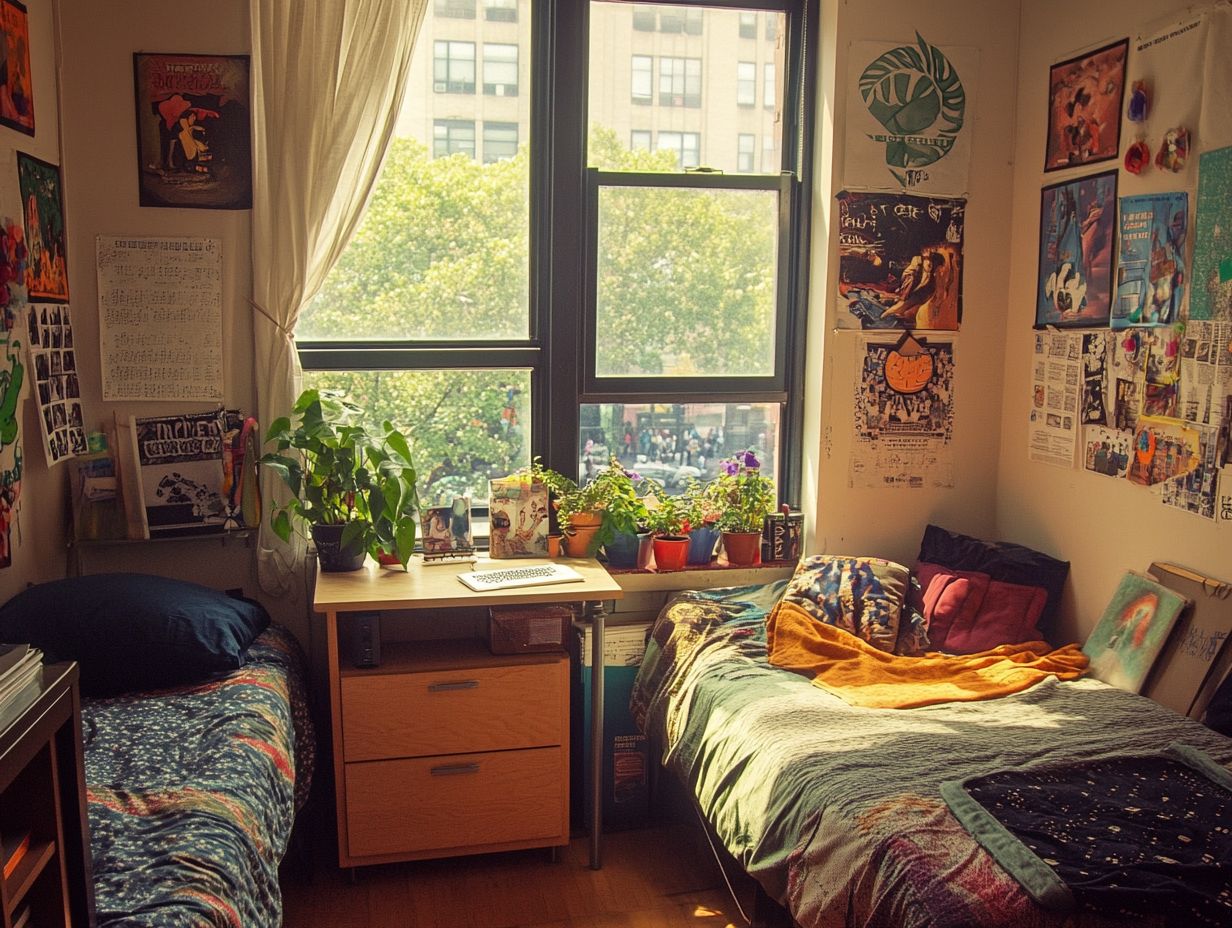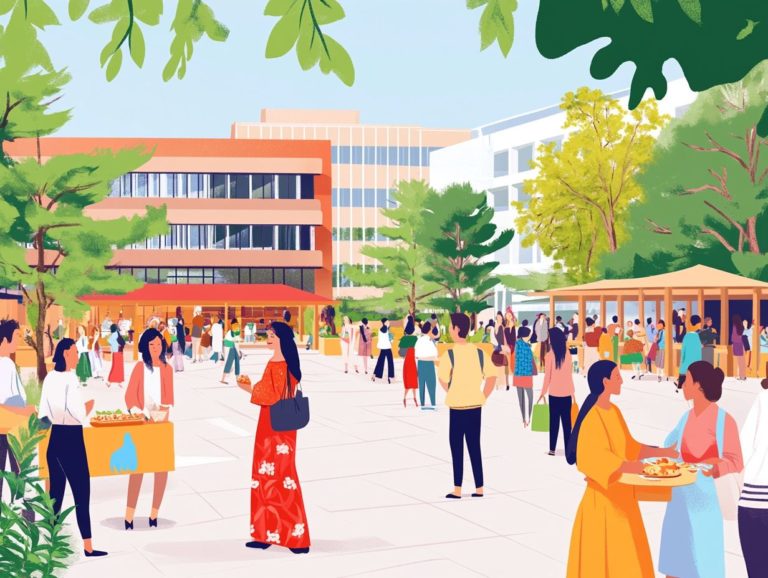Living Arrangements for Students Abroad
Choosing the ideal living arrangement during your study abroad experience can profoundly influence how you enjoy your time away.
With a multitude of options at your fingertips, it s crucial to consider factors such as location, accessibility, cost, and your preferences regarding roommates.
This article delves into both on-campus and off-campus housing options, covering everything from dormitories and shared apartments to private rentals and homestays.
We ll outline the benefits and drawbacks of each choice, empowering you to make a decision that seamlessly aligns with your lifestyle and budget.
Contents
- Key Takeaways:
- Factors to Consider When Choosing a Living Arrangement
- On-Campus Housing Options
- Off-Campus Housing Options
- Benefits and Drawbacks of Each Living Arrangement
- Frequently Asked Questions
- What are the different living arrangements available for students abroad?
- What is a homestay and how does it work for students abroad?
- What is the cost of living arrangements for students abroad?
- Do I have to arrange my own living accommodations as a student studying abroad?
- What should I consider when choosing a living arrangement for studying abroad?
- Can I change my living arrangement while studying abroad?
Key Takeaways:

- Consider your location, budget, and roommate preferences when choosing your living arrangement.
- On-campus options include dorms and shared apartments; off-campus choices range from private apartments to homestays.
- Each type of housing brings its own perks and challenges, from the community feel of dorms to the independence of private apartments.
Factors to Consider When Choosing a Living Arrangement
When embarking on your study abroad adventure, choosing the right living arrangement is an important choice that involves several key factors, including location, accessibility, cost, and the types of accommodations available.
For international students like yourself, understanding these factors can significantly enrich your experience, enabling deeper cultural immersion, fostering local connections, and effectively managing living expenses.
Safety concerns, the risk of rental fraud, and an understanding of tenant rights are also crucial considerations that will shape your decision. These factors will ultimately guide you in choosing between options such as homestays, private apartments, or shared student housing.
Location and Accessibility
Choosing the right location is crucial for you as an international student. It directly influences your accessibility to campus, essential services, and the local culture.
Living close to public transport can transform your daily commutes, allowing you to reach your classes and university facilities effortlessly. This convenience saves you valuable time and opens up countless opportunities to explore local amenities, from grocery stores to charming cafes perfect for studying or socializing.
Using neighborhood guides can offer you valuable insights into nearby attractions, helping foster a sense of belonging and community. By understanding local cultural nuances, you can enhance your study abroad experience, making it easier for you to navigate your new environment and enrich your educational journey.
Cost and Budget
Understanding your budget is essential when exploring accommodation options for studying abroad, as living expenses can fluctuate dramatically across different global cities.
Various types of housing, such as dormitories, apartments, or shared living spaces, each come with their own cost structures. Rent can range from wallet-friendly options in less sought-after neighborhoods to eye-watering prices in prime central locations.
You ll also need to factor in additional utility costs think electricity, water, internet, and sometimes even heating or cooling because these can significantly inflate your monthly expenses.
Financial considerations play a critical role too. Many institutions provide scholarships or assistance programs that can help ease some of these financial pressures.
With thoughtful planning and proactive budgeting strategies, managing expenses in the competitive rental market becomes much more attainable. This allows you to concentrate on your studies and truly savor your time abroad.
Roommate Preferences
When you re selecting a shared apartment, understanding your roommate preferences is crucial for creating a harmonious living space.
This means evaluating how well your daily lives match consider work schedules and social habits to ensure that both of you can coexist comfortably. It s also important to think about communication styles; some might prefer direct confrontation, while others may choose a more subtle approach.
Establishing clear expectations around shared areas, such as cleanliness and noise levels, can help prevent misunderstandings later. Tapping into social networks, like local housing groups or platforms such as Roommates.com, is invaluable for finding someone who aligns with your values.
Discussing conflicts openly can help promote peaceful cohabitation. Agreeing on resolution strategies can set the stage for a positive living experience.
On-Campus Housing Options

On-campus housing options, like dormitories, offer a remarkable chance to fully immerse yourself in the academic atmosphere.
Here, you can engage in community events that foster friendships and connections, greatly enriching your study abroad experience.
Dormitories
Dormitories are an excellent choice for students studying abroad. They provide shared living spaces and communal areas that naturally encourage social interaction and cultural exchange.
These living arrangements include essential amenities such as communal kitchens, study lounges, and shared spaces for relaxation and study, all designed to foster collaboration and camaraderie among residents. Safety is a top priority, with access control systems systems that limit who can enter the building and on-site staff ensuring a secure environment for everyone.
Most dorms come with guidelines promoting respect and responsibility among roommates, vital for maintaining harmony in shared living situations. When you re searching for a roommate, you have the chance to connect with peers from diverse cultural backgrounds, enhancing your global perspective.
These close living quarters can lead to lasting friendships and invaluable experiences that truly enrich your time abroad.
Shared apartments provide you with a flexible and often cost-effective living arrangement, perfect for navigating roommate preferences and customizing your living experience.
By creating a collaborative atmosphere, these arrangements can lead to meaningful connections and shared experiences that greatly enrich your personal growth and cultural immersion.
However, you should balance the benefits with potential challenges, such as differing lifestyles and compatibility issues that might arise.
Successful shared living often hinges on negotiating rental contracts that clearly define expectations and responsibilities, laying the groundwork for harmonious coexistence.
When managed thoughtfully, these living situations can deepen your local ties and provide valuable insights into the community through shared activities and conversations.
Off-Campus Housing Options
Off-campus housing options, like private apartments and homestays, offer a range of alternative living experiences. These choices can differ significantly in cost, amenities, and cultural exposure, allowing you to tailor your living situation to your preferences and needs.
Private Apartments
Private apartments can offer you a comfortable and independent living experience as an international student, often featuring modern amenities tailored to your individual preferences.
These spaces provide a sense of privacy, allowing you to concentrate on your studies and personal growth. They also come with the convenience of your own kitchen and living area, creating a homely atmosphere that makes it easier to navigate life in a new country.
When weighing your rental options, it s essential to exercise caution. To avoid rental fraud, verify listings through reputable housing resources and seek out reviews from previous tenants.
Ensuring that contracts are clearly outlined and legally binding will protect you against potential disputes, paving the way for a seamless transition into this exciting new chapter of your life.
In conclusion, both on-campus and off-campus housing options offer unique benefits that can enhance your study abroad experience. Whether you choose the vibrant community of dormitories or the independence of private apartments, ensure that your living arrangement aligns with your lifestyle and preferences.
Start your housing search today to find the perfect living situation!
Homestays

Homestays offer a unique opportunity to live with a host family. This creates an immersive experience that enhances language learning and builds local connections.
Living in a homestay lets you experience everyday culture and traditions. It also encourages personal growth through close interactions with your hosts. You ll find that these arrangements greatly enrich your understanding of the local lifestyle, culinary delights, and social etiquette elements that are crucial for your seamless integration into the community.
Of course, living with a host family can come with its own set of challenges, such as navigating cultural differences and overcoming communication barriers. To make the most of your experience, actively engage with your hosts, participate in family activities, and communicate openly about any discomforts or expectations. This proactive approach can lead to rewarding relationships and invaluable insights into the local culture.
Benefits and Drawbacks of Each Living Arrangement
Evaluating the benefits and drawbacks of each living arrangement is essential for you as an international student. This assessment significantly influences your overall study abroad experience and your satisfaction with the accommodations you choose.
Pros and Cons of On-Campus Housing
On-campus housing presents advantages and disadvantages for international students. While it offers community events and opportunities for cultural immersion, it may also come with a lack of privacy and independence.
The convenience of being close to university resources like libraries, study centers, and advisor offices can significantly enrich your academic experience. Connecting with peers at community gatherings fosters a sense of belonging in what can often feel like a foreign environment.
However, these benefits come with trade-offs. Shared living spaces can lead to noise and distractions, and strict regulations regarding guest policies and the use of common areas may feel limiting. It’s essential to weigh these factors carefully before making a decision, ensuring you strike the right balance between engagement opportunities and your need for personal space and autonomy.
Pros and Cons of Off-Campus Housing
Off-campus housing allows you, as an international student, to explore private apartments or homestays that may resonate more closely with your lifestyle preferences than traditional on-campus options.
This level of flexibility fosters a deeper sense of independence. You can choose living arrangements that truly reflect your personal tastes and needs. You’ll likely find great cost savings that can help you enjoy your study abroad experience even more!
Watch out for some challenges, like managing utilities, such as water and electricity, which can vary a lot in cost and availability. Familiarizing yourself with local tenant rights is crucial, ensuring that you are protected and informed as you embark on this rewarding journey toward autonomy.
Frequently Asked Questions
What are the different living arrangements available for students abroad?

Some common options for living arrangements for students abroad include dormitories, homestays, shared apartments, and student apartments.
What is a homestay and how does it work for students abroad?
A homestay is when a student lives with a local family in their home. This allows the student to experience the local culture and practice language skills. Typically, the student will have their own room and share common spaces with the family.
What is the cost of living arrangements for students abroad?
Costs for living arrangements vary widely based on location and type, with dormitories and shared apartments often being cheaper. Homestays and student apartments may be more expensive.
Do I have to arrange my own living accommodations as a student studying abroad?
Whether you need to arrange housing depends on your program and university. Some offer on-campus housing or help you find suitable options, while others require you to make your own arrangements.
What should I consider when choosing a living arrangement for studying abroad?
Consider your budget, location, safety, and how close you are to campus.
Research the local culture and norms to ensure a comfortable living experience.
Can I change my living arrangement while studying abroad?
Yes, you can change your living arrangement while studying abroad. Keep in mind that this may come with extra costs, so communicate with your program or university for a smooth transition.






